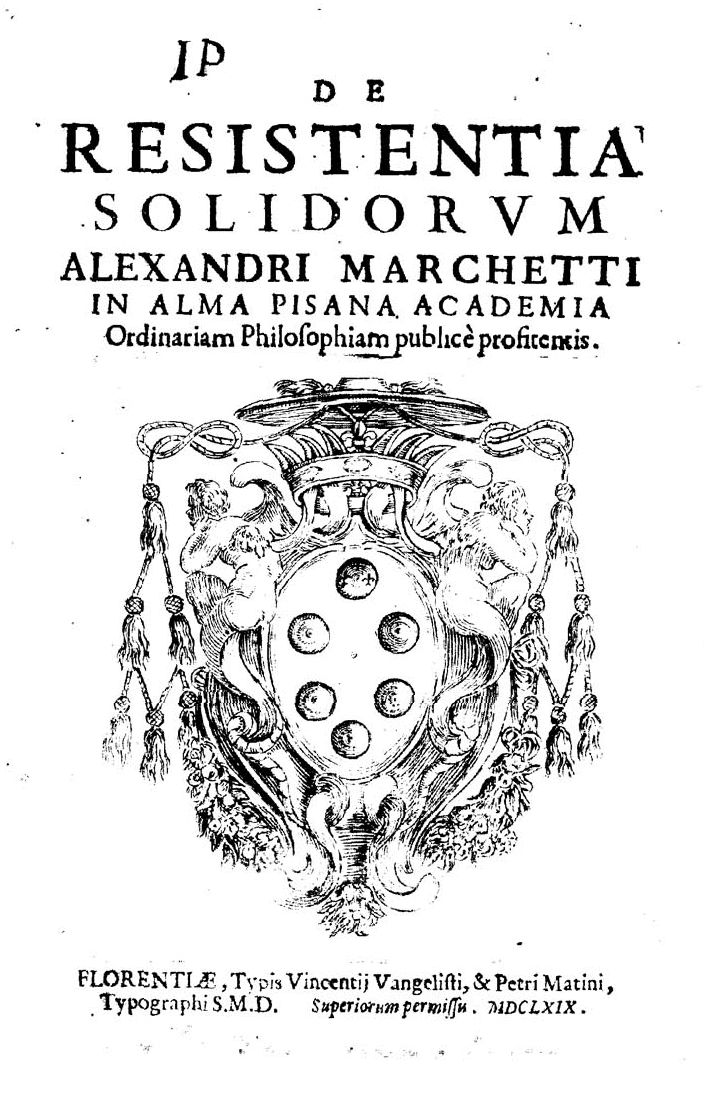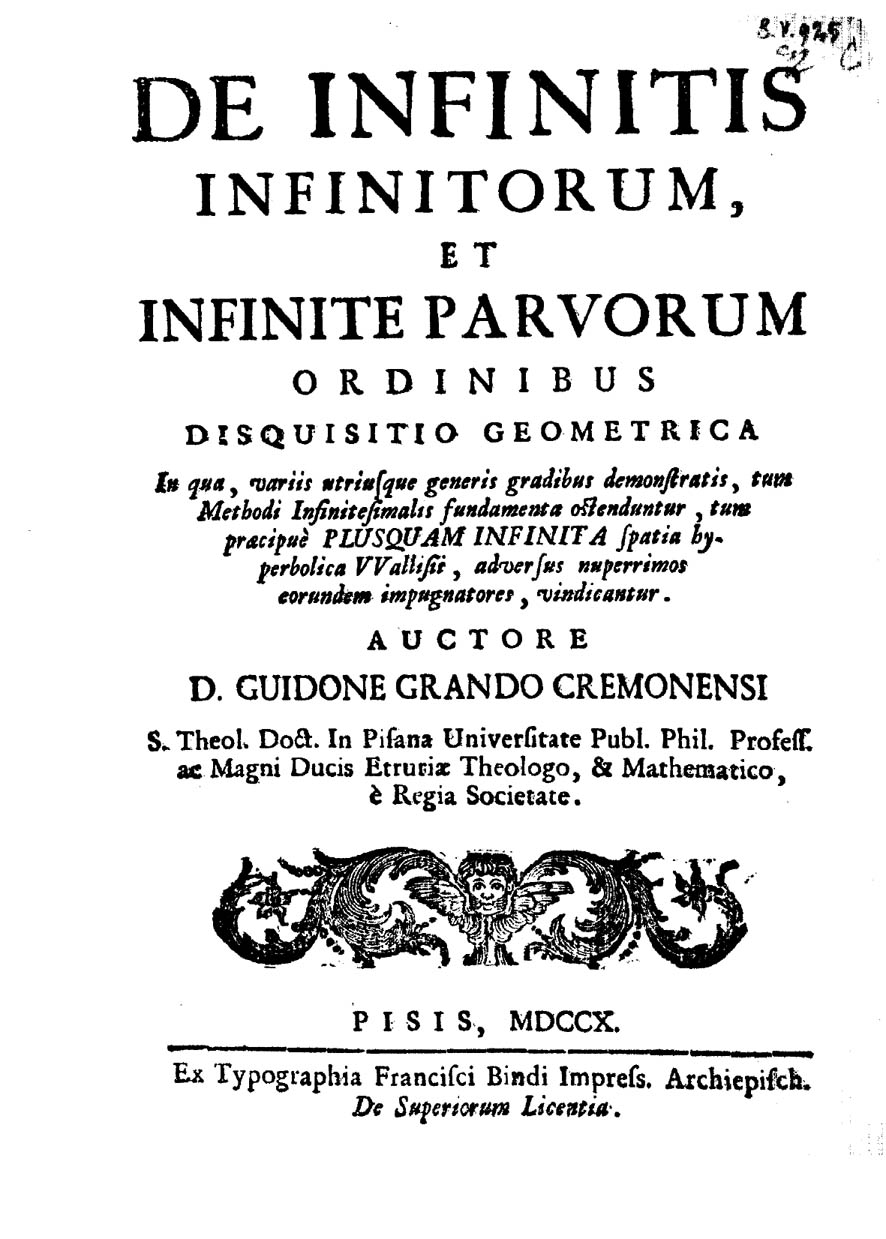|
Alessandro Marchetti (mathematician)
Alessandro Marchetti (17 March 1633 – 6 September 1714) was an Italian mathematician, noted for criticizing some conclusions of Guido Grandi, a student of Giovanni Alfonso Borelli who was influenced by Galileo and Aristotle. In 1669 Marchetti completed the first known Italian vernacular translation of Lucretius Titus Lucretius Carus ( , ; – ) was a Roman poet and philosopher. His only known work is the philosophical poem '' De rerum natura'', a didactic work about the tenets and philosophy of Epicureanism, and which usually is translated in ...' Epicurean epic poem '' De Rerum Natura''. He was denied permission to publish his translation, entitled ''Della Natura delle Cose'', but it circulated widely in manuscript form before its first printing in 1717. References Works * * * * Literature * Jonathan Israel, ''Radical Enlightenment'', Oxford University Press, 2002. . * Cosmo Gordon, ''A Bibliography of Lucretius'', Rupert Hart-Davis, 1969. ASIN B000OJY ... [...More Info...] [...Related Items...] OR: [Wikipedia] [Google] [Baidu] |
Empoli
Empoli () is a town and ''comune'' in the Metropolitan City of Florence, Tuscany, Italy, about southwest of Florence, to the south of the Arno in a plain formed by the river. The plain has been usable for agriculture since Roman times. The commune's territory becomes hilly as it departs from the river. Empoli is on the main railway line from Florence to Pisa, and is the point of divergence of a line to Siena. Empoli has an enduring tradition as an agricultural centre. It has given its name to a local variety of artichoke. History Archaeological finds have revealed that Empoli was already settled in the early Roman Empire times, and continued to exist until the 4th century AD. The river acted as a communication way for the trade of agricultural products, together with the local amphorae. In the Tabula Peutingeriana of the 4th century Empoli is called ''in portu'' ("in the port") as a river port on the Roman road ''Via Quinctia'', which led from Fiesole and Florence to Pisa. Emp ... [...More Info...] [...Related Items...] OR: [Wikipedia] [Google] [Baidu] |
Pisa
Pisa ( , or ) is a city and ''comune'' in Tuscany, central Italy, straddling the Arno just before it empties into the Ligurian Sea. It is the capital city of the Province of Pisa. Although Pisa is known worldwide for its leaning tower, the city contains more than twenty other historic churches, several medieval palaces, and bridges across the Arno. Much of the city's architecture was financed from its history as one of the Italian maritime republics. The city is also home to the University of Pisa, which has a history going back to the 12th century, the Scuola Normale Superiore di Pisa, founded by Napoleon in 1810, and its offshoot, the Sant'Anna School of Advanced Studies.Scuola Superiore Sant'Anna di Pisa Information statistics History
|
Italy
Italy ( it, Italia ), officially the Italian Republic, ) or the Republic of Italy, is a country in Southern Europe. It is located in the middle of the Mediterranean Sea, and its territory largely coincides with the homonymous geographical region. Italy is also considered part of Western Europe, and shares land borders with France, Switzerland, Austria, Slovenia and the enclaved microstates of Vatican City and San Marino. It has a territorial exclave in Switzerland, Campione. Italy covers an area of , with a population of over 60 million. It is the third-most populous member state of the European Union, the sixth-most populous country in Europe, and the tenth-largest country in the continent by land area. Italy's capital and largest city is Rome. Italy was the native place of many civilizations such as the Italic peoples and the Etruscans, while due to its central geographic location in Southern Europe and the Mediterranean, the country has also historically b ... [...More Info...] [...Related Items...] OR: [Wikipedia] [Google] [Baidu] |
Mathematician
A mathematician is someone who uses an extensive knowledge of mathematics in their work, typically to solve mathematical problems. Mathematicians are concerned with numbers, data, quantity, mathematical structure, structure, space, Mathematical model, models, and mathematics#Calculus and analysis, change. History One of the earliest known mathematicians were Thales of Miletus (c. 624–c.546 BC); he has been hailed as the first true mathematician and the first known individual to whom a mathematical discovery has been attributed. He is credited with the first use of deductive reasoning applied to geometry, by deriving four corollaries to Thales' Theorem. The number of known mathematicians grew when Pythagoras of Samos (c. 582–c. 507 BC) established the Pythagoreans, Pythagorean School, whose doctrine it was that mathematics ruled the universe and whose motto was "All is number". It was the Pythagoreans who coined the term "mathematics", and with whom the study of mathemat ... [...More Info...] [...Related Items...] OR: [Wikipedia] [Google] [Baidu] |
Angelo Marchetti
Angelo Marchetti (1674 – 1753) was an Italian mathematician and cosmographer from Pistoia. He was Alessandro Marchetti's son and a member of the Academy of Arcadia in Rome , established_title = Founded , established_date = 753 BC , founder = King Romulus ( legendary) , image_map = Map of comune of Rome (metropolitan city of Capital Rome, region Lazio, Italy).svg , map_caption .... Works * * * * References 1674 births 1753 deaths 17th-century Italian astronomers 17th-century Italian mathematicians 18th-century Italian astronomers 18th-century Italian mathematicians Members of the Academy of Arcadians People from Pistoia {{Italy-mathematician-stub ... [...More Info...] [...Related Items...] OR: [Wikipedia] [Google] [Baidu] |
Guido Grandi
Guido Grandi Dom Guido Grandi, O.S.B. Cam. (1 October 1671 – 4 July 1742) was an Italian monk, priest, philosopher, theologian, mathematician, and engineer. Life Grandi was born on 1 October 1671 in Cremona, Italy and christened Luigi Francesco Lodovico. When he was of age, he was educated at the Jesuit college there. After he completed his studies there in 1687, he entered the novitiate of the Camaldolese monks at Ferrara and took the name of Guido. In 1693 he was sent to the Monastery of St. Gregory the Great, the Camaldolese house in Rome, to complete his studies in philosophy and theology in preparation for Holy Orders. A year later, Grandi was assigned as professor of both fields at the Camaldolese Monastery of St. Mary of the Angels in Florence. It appears that it was during this period of his life that he took an interest in mathematics. He did his research privately, however, as he was appointed professor of philosophy at St. Gregory Monastery in 1700, subseque ... [...More Info...] [...Related Items...] OR: [Wikipedia] [Google] [Baidu] |
Giovanni Alfonso Borelli
Giovanni Alfonso Borelli (; 28 January 1608 – 31 December 1679) was a Renaissance Italian physiologist, physicist, and mathematician. He contributed to the modern principle of scientific investigation by continuing Galileo's practice of testing hypotheses against observation. Trained in mathematics, Borelli also made extensive studies of Jupiter's moons, the mechanics of animal locomotion and, in microscopy, of the constituents of blood. He also used microscopy to investigate the stomatal movement of plants, and undertook studies in medicine and geology. During his career, he enjoyed the patronage of Queen Christina of Sweden. Biography Giovanni Borelli was born on 28 January 1608 in the district of Castel Nuovo, in Naples. He was the son of Spanish infantryman Miguel Alonso and a local woman named Laura Porello (alternately ''Porelli'' or ''Borelli''.) Borelli eventually traveled to Rome where he studied under Benedetto Castelli, matriculating in mathematics at Sapienz ... [...More Info...] [...Related Items...] OR: [Wikipedia] [Google] [Baidu] |
Galileo
Galileo di Vincenzo Bonaiuti de' Galilei (15 February 1564 – 8 January 1642) was an Italian astronomer, physicist and engineer, sometimes described as a polymath. Commonly referred to as Galileo, his name was pronounced (, ). He was born in the city of Pisa, then part of the Duchy of Florence. Galileo has been called the "father" of observational astronomy, modern physics, the scientific method, and modern science. Galileo studied speed and velocity, gravity and free fall, the principle of relativity, inertia, projectile motion and also worked in applied science and technology, describing the properties of pendulums and " hydrostatic balances". He invented the thermoscope and various military compasses, and used the telescope for scientific observations of celestial objects. His contributions to observational astronomy include telescopic confirmation of the phases of Venus, observation of the four largest satellites of Jupiter, observation of Satu ... [...More Info...] [...Related Items...] OR: [Wikipedia] [Google] [Baidu] |
Aristotle
Aristotle (; grc-gre, Ἀριστοτέλης ''Aristotélēs'', ; 384–322 BC) was a Greek philosopher and polymath during the Classical Greece, Classical period in Ancient Greece. Taught by Plato, he was the founder of the Peripatetic school of philosophy within the Lyceum (classical), Lyceum and the wider Aristotelianism, Aristotelian tradition. His writings cover many subjects including Physics (Aristotle), physics, biology, zoology, metaphysics, logic, ethics, aesthetics, Poetics (Aristotle), poetry, theatre, music, rhetoric, psychology, linguistics, economics, politics, meteorology, History of geology, geology, and government. Aristotle provided a complex synthesis of the various philosophies existing prior to him. It was above all from his teachings that Western culture, the West inherited its intellectual lexicon, as well as problems and methods of inquiry. As a result, his philosophy has exerted a unique influence on almost every form of knowledge in the West a ... [...More Info...] [...Related Items...] OR: [Wikipedia] [Google] [Baidu] |
Lucretius
Titus Lucretius Carus ( , ; – ) was a Roman poet and philosopher. His only known work is the philosophical poem '' De rerum natura'', a didactic work about the tenets and philosophy of Epicureanism, and which usually is translated into English as ''On the Nature of Things''—and somewhat less often as ''On the Nature of the Universe''. Lucretius has been credited with originating the concept of the three-age system that was formalised in 1836 by C. J. Thomsen. Very little is known about Lucretius's life; the only certainty is that he was either a friend or client of Gaius Memmius, to whom the poem was addressed and dedicated. ''De rerum natura'' was a considerable influence on the Augustan poets, particularly Virgil (in his ''Aeneid'' and '' Georgics'', and to a lesser extent on the '' Eclogues'') and Horace. The work was almost lost during the Middle Ages, but was rediscovered in 1417 in a monastery in Germany by Poggio Bracciolini and it played an important r ... [...More Info...] [...Related Items...] OR: [Wikipedia] [Google] [Baidu] |
De Rerum Natura
''De rerum natura'' (; ''On the Nature of Things'') is a first-century BC didactic poem by the Roman poet and philosopher Lucretius ( – c. 55 BC) with the goal of explaining Epicurean philosophy to a Roman audience. The poem, written in some 7,400 dactylic hexameters, is divided into six untitled books, and explores Epicurean physics through poetic language and metaphors. Greenblatt (2011). Namely, Lucretius explores the principles of atomism; the nature of the mind and soul; explanations of sensation and thought; the development of the world and its phenomena; and explains a variety of celestial and terrestrial phenomena. The universe described in the poem operates according to these physical principles, guided by ''fortuna'' ("chance"), and not the divine intervention of the traditional Roman deities. Background To the Greek philosopher Epicurus, the unhappiness and degradation of humans arose largely from the dread which they entertained of the power of the ... [...More Info...] [...Related Items...] OR: [Wikipedia] [Google] [Baidu] |







